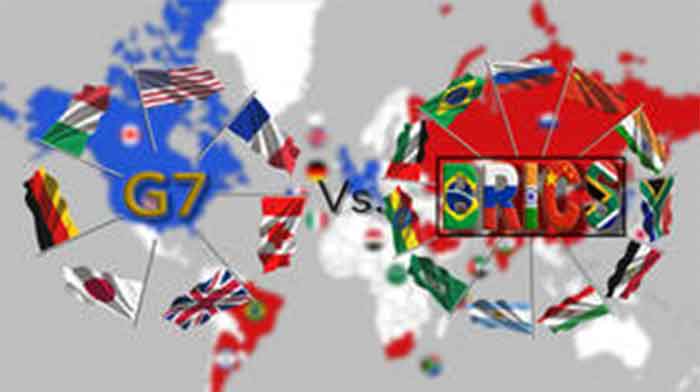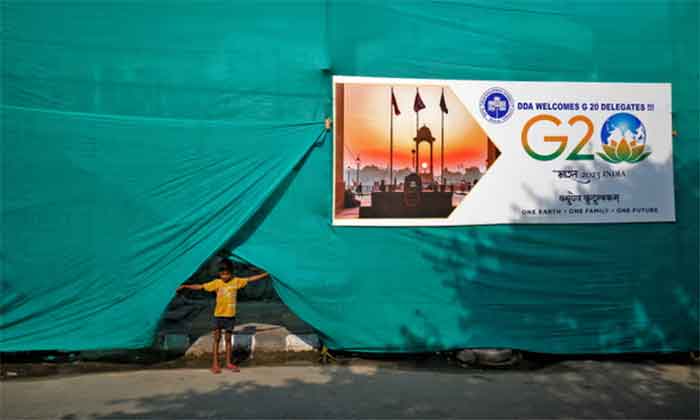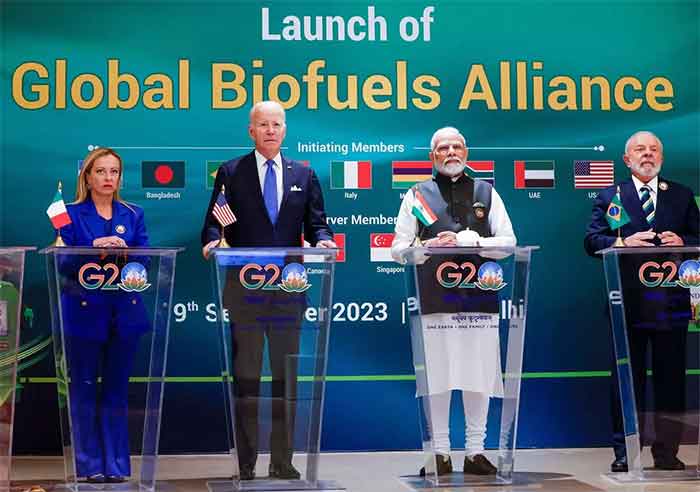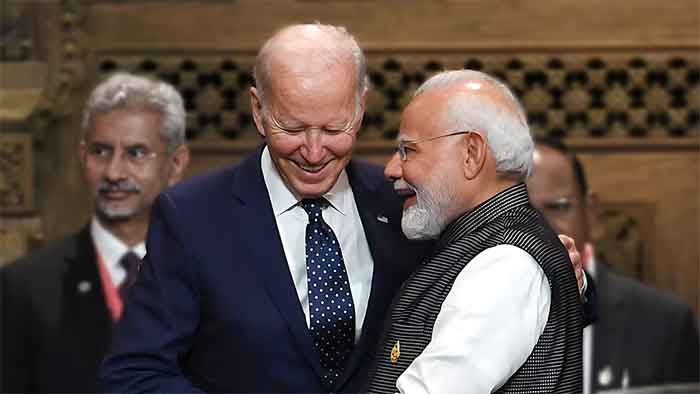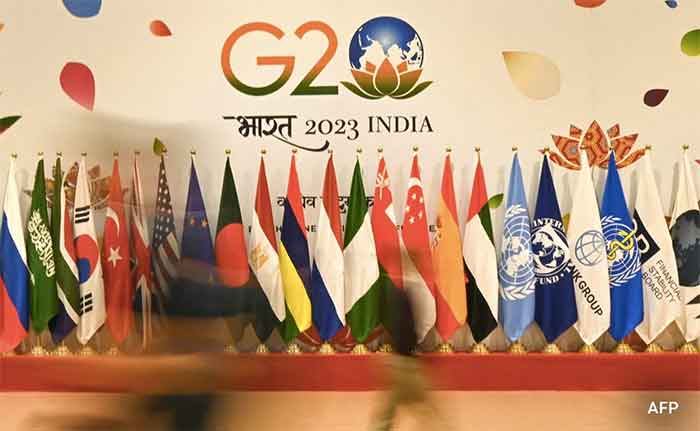
While India is glowing with the achievement of successfully concluding the G20 Summit in New Delhi, questions about outcome of the summit are being raised by different parties concerned with global issues. Following is a brief report on the summit:
West Failed To ‘Ukrainize’ G20, Says Lavrov
The West failed to make the G20 summit in New Delhi revolve around the Ukraine conflict, thanks in no small part to the efforts of developing countries, Russian Foreign Minister Sergey Lavrov has noted.
Speaking to reporters on Sunday, Lavrov, who headed the Russian delegation at the gathering, praised summit host India, which he claimed has helped to consolidate the countries of the Global South. As a result, they stood up “to protect their legitimate interests,” which made it possible “to prevent the West from once again Ukrainizing the entire agenda” of the summit and diverting attention from the urgent problems facing emerging economies.
The Russia foreign minister pointed out that the joint declaration “mentions the Ukraine crisis, but only in the context of the need to resolve all conflicts” in accordance with the principles of the UN Charter.
Lavrov insisted that the G20 must focus on economic and financial issues, and praised emerging countries, which prevented the meeting from turning into a “political club.”
Ukraine Fumes
A BBC report said:
Russia’s Foreign Minister Sergei Lavrov has praised a joint declaration by G20 leaders in Delhi that avoids condemning Moscow for war in Ukraine.
Russia had not expected consensus and agreement on the wording was “a step in the right direction”, said Lavrov.
The closing G20 statement denounced using force for territorial gain but made no mention of Russian aggression, prompting criticism from Ukraine.
The report said:
Very few had expected a joint declaration at this year’s G20 – not least on the first day of the summit. The group is deeply divided over the ongoing Ukraine war. Neither Russia’s Vladimir Putin nor China’s Xi Jinping turned up in Delhi, sending lower-level delegations instead.
So there was surprise when, just hours after the summit started, Indian Prime Minister Narendra Modi announced consensus had been reached on how to phrase the Ukraine section of the statement, which saw last year’s direct criticism of Russia watered down.
Lavrov told a news conference on Sunday that a “milestone” had been reached.
“Speaking frankly we did not expect that. We were ready to defend our wording of the text. The Global South is no longer willing to be lectured,” he said in answer to a question by the BBC’s Yogita Limaye.
The UK and U.S. talked up the joint statement too, but Ukraine – which took part in last year’s Bali summit but was not invited this year – said it was “nothing to be proud of”.
It calls on states to “refrain from the threat or use of force to seek territorial acquisition”, which could be seen as directed at Russia, but also notes “different views and assessments of the situation”.
West Faces Resistance
Before the G20 Summit Declaration was released, Reuters reported that the paragraph on Ukraine had been a major stumbling block as Western countries pushed for a strong condemnation of Russia, an approach that encountered opposition from other members.
Shifting Power Dynamics Within G20
The report said:
Analysts say the economic balance and power dynamics is shifting within the G20, away from advanced market economies of the West to emerging giants, particularly in Asia.
Millions Of Human Beings Still Go Hungry, Says Lula
Another BBC report said:
“We are living in a world where wealth is more concentrated, in which millions of human beings still go hungry, where sustainable development is always threatened, in which global governance institutions still reflect the reality of middle of the last century,” said Brazilian President Luiz Inacio Lula da Silva.
Final Document Hints At Failure Of Plans To Isolate Russia, Says Die Zeit
The absence of a passage condemning Russia in the final G20 document hints at the failure of plans to isolate the country. This is according to an article in the online version of the newspaper Die Zeit.
“Was the G20 summit a success, contrary to expectations? Chancellor Olaf Scholz at least tried to present the result that way. But the reality is rather sobering,” the article says.
The publication’s columnist recalled that the statement adopted a year ago at the summit in Bali was regarded as a “slap in the face” of the Russian Federation. Now Scholz “admits what can no longer be hidden”: there is no condemnation in the declaration, “there was no mention of a slap,” the article notes.
At a press conference on Saturday, the German Chancellor said he considered the final statement a success. In the document the G20 leaders acknowledged the difference in views and assessments on the situation in Ukraine among members of the community. They called on all states to comply with the principles of international law, including those regarding sovereignty and territorial integrity, and also noted the importance of peaceful resolution of conflicts and dialogue.
Differences Of Opinion On Ukraine
A media report said:
The nations of the G20 managed to agree a final declaration of the summit in New Delhi that acknowledges the lack of consensus among the world’s top economies regarding the conflict between Russia and Ukraine.
Reuters reported earlier that the Ukrainian issue had been a major stumbling block in finalizing the document as the Western push for strong condemnation of Russia over its military operation in the neighboring country faced resistance from other G20 members.
According to the agency, the paragraph devoted to the “geopolitical situation” remained blank in the declaration’s draft on Friday, while all the other paragraphs covering topics ranging from global debt and cryptocurrencies to climate change had already been agreed.
Media Expected U.S. Domination Of The Summit
With Russian President Vladimir Putin and his Chinese counterpart Xi Jinping both skipping the event in New Delhi, the media expected the summit to be dominated by the U.S. and its allies. However, the West was unable to persuade the nations of the so-called Global South to change their stance on the crisis.
The final text of the declaration said that the G20 members “highlighted the human suffering and negative added impacts of the war in Ukraine with regard to global food and energy security, supply chains, macro-financial stability, inflation and growth.”
Developing countries, which have already been hit hard by the Covid-19 pandemic, are the ones suffering the most due to the conflict, it added.
The document stressed that “there were different views and assessments of the situation” among the members about the conflict in Ukraine.
According to the declaration, the G20 leaders vow to “unite” in tackling the impact of the crisis on the global economy. It also said that the group would “welcome all relevant and constructive initiatives that support a comprehensive, just, and durable peace in Ukraine” that would uphold the principles of the UN Charter.
Voice Of The Global South
Indian Prime Minister Narendra Modi entered the summit aiming to “strengthen the voice of the Global South,” he told delegates on Saturday morning.
Lula Promises To Ignore ICC Arrest Warrant On Putin
A media report said:
Brazil will ignore the International Criminal Court’s arrest warrant on Vladimir Putin, President Luiz Inacio Lula da Silva has said. He added that the Russian president can visit his country without the fear of detention.
“I believe that Putin can easily go to Brazil,” Lula told Indian website Firstpost on the sidelines of the G20 summit in New Delhi. “What can I say to you is that if I am president of Brazil, and he comes to Brazil, and he comes to Brazil, there is no way he will be arrested.”
In March 2023, The Hague-based court issued warrants on Putin and Maria Lvova-Belova, Russia’s children’s rights commissioner, for alleged “unlawful deportation and transfer” of children.
Moscow does not recognize the authority of the ICC and has denied the allegations, insisting that it was evacuating children to safety during its armed conflict with Ukraine. Nevertheless, Putin ultimately chose not to travel to South Africa, a party to the ICC, for a BRICS summit in August, opting instead to participate in the event remotely.
Speaking to Firstpost, Lula reiterated that Brazil did not want to “participate in war efforts” echoing his government’s decision against supplying weapons to Ukraine or imposing sanctions on Russia. He argued that the G20 was “not appropriate forum” to discuss the conflict and suggested that it should rather be addressed at the UN General Assembly later this month.
“That is the place for us to try to discuss peace. That is the place for us to call Putin and Zelensky to a negotiation table because no one wants war. Everybody is against war. We want peace,” Lula said.
He praised the joint declaration adopted by G20 leaders on Saturday, which acknowledged the different positions on the Ukrainian crisis, without blaming any particular side.
The G20 Leaders’ Declaration
Media reports said:
The world’s 20 largest economies released a joint declaration after a summit in the Indian capital of New Delhi on Saturday. The document was hashed out amid major geopolitical tensions between a number of members, while the conflict in Ukraine threatened to derail its adoption.
Ukraine
The declaration was always unlikely to take an explicit side on the conflict in Ukraine, due both to disagreements among members, and host nation India’s neutral position on the matter. With the paragraphs on Ukraine the last to be finalized, the declaration states that all nations “must refrain from the threat or use of force to seek territorial acquisition against the territorial integrity and sovereignty or political independence of any state,” adding that “the use or threat of use of nuclear weapons is inadmissible.”
With Russia and Ukraine each striking territory claimed by the other, this wording offers a technical compromise that Russia’s representative, Foreign Minister Sergey Lavrov, and his Western counterparts could both accept.
Black Sea Grain Initiative
Noting that “the G20 is not the platform to resolve geopolitical and security issues,” the declaration calls for a revival of the Black Sea Grain Initiative, which Russia withdrew from in July over the failure of the US and EU to keep their promise to facilitate exports of Russian food products and fertilizers.
The declaration explicitly calls for the “unimpeded deliveries of grain, foodstuff, and fertilizers/inputs” from both Russia and Ukraine.
Reshaping Global Financial Institutions
Accordingly, the declaration calls for a reshaping of global financial institutions to “promote growth, reduce inequalities and maintain macroeconomic and financial stability.”
Developing countries should have their debts restructured in some cases, and these nations should be given access to a “non-discriminatory, fair, open, inclusive, equitable, sustainable and transparent multilateral trading system,” said the document.
Climate-crisis And Grains
The document also calls for increased research into “climate-resilient and nutritious grains,” and an increase in global fertilizer production to combat food shortages.
Meaningful Actions For Climate
The declaration calls for “the full and effective implementation of the Paris Agreement and its temperature goal.” Reaching this goal of limiting global warming to two degrees above pre-industrial levels will require “meaningful and effective actions,” including higher carbon taxes, an end to fossil fuel subsidies, and the phasing out of coal power, the document states.
Reaching these targets will be a costly enterprise, however. The declaration notes that developing countries will need up to $5.9 trillion by 2030, while the entire world will need $4 trillion per year by 2030 to reduce carbon emissions to net zero by 2050.
The Multipolar World
While the leaders of India, China, and Russia have all heralded the emergence of a “multipolar” world order, in which the collective West is no longer the sole arbiter of international relations, the declaration avoids mention of the term.
Instead, it calls for reform at the United Nations, stating that the UN must be “responsive to the entire membership, faithful to its founding purposes and principles of its Charter and adapted to carrying out its mandate.” India in particular has repeatedly called for a permanent seat on the UN Security Council, and for more developing countries to be given seats on the body.
The language of the final declaration, however, is more vague. It calls for “a more inclusive and reinvigorated multilateralism,” to “make global governance more representative.”
Talk of multipolarity will likely dominate future meetings of the G20, with BRICS members Brazil and South Africa due to host the 2024 and 2025 summits, respectively.

